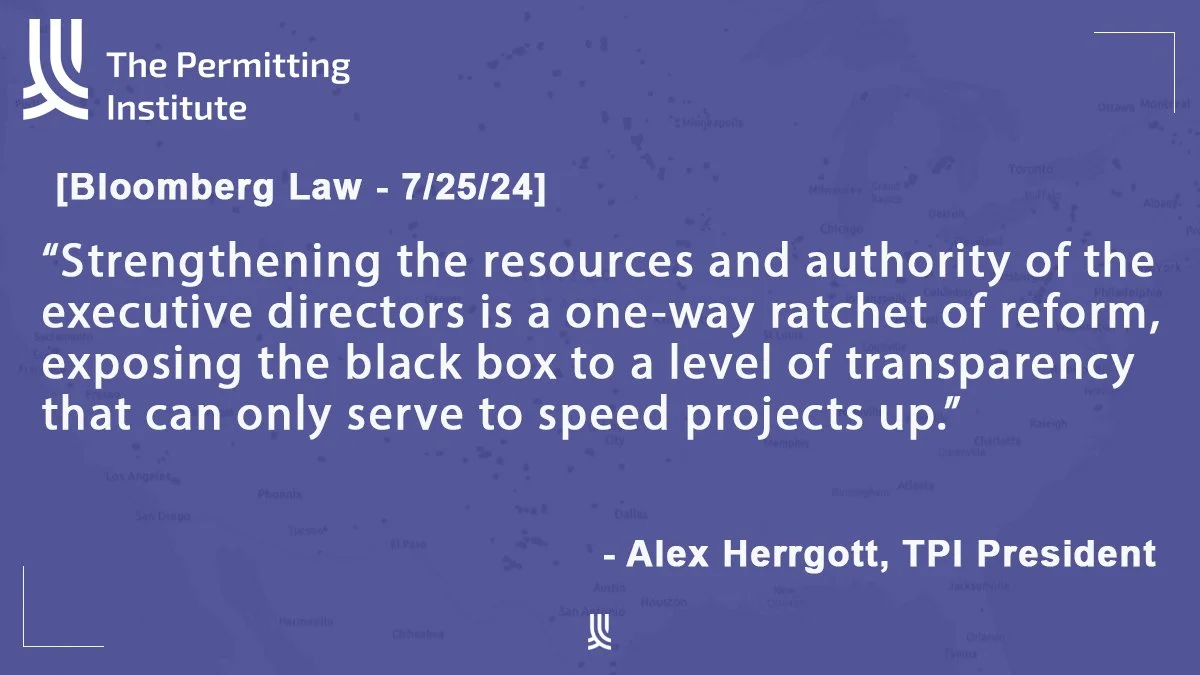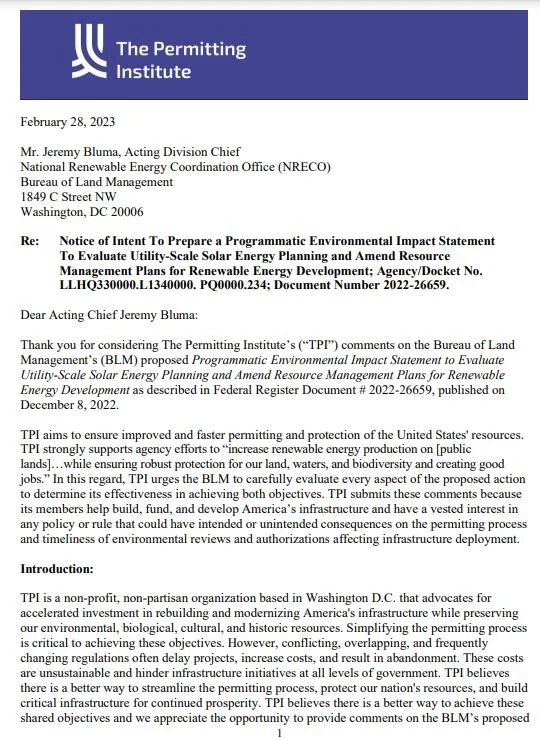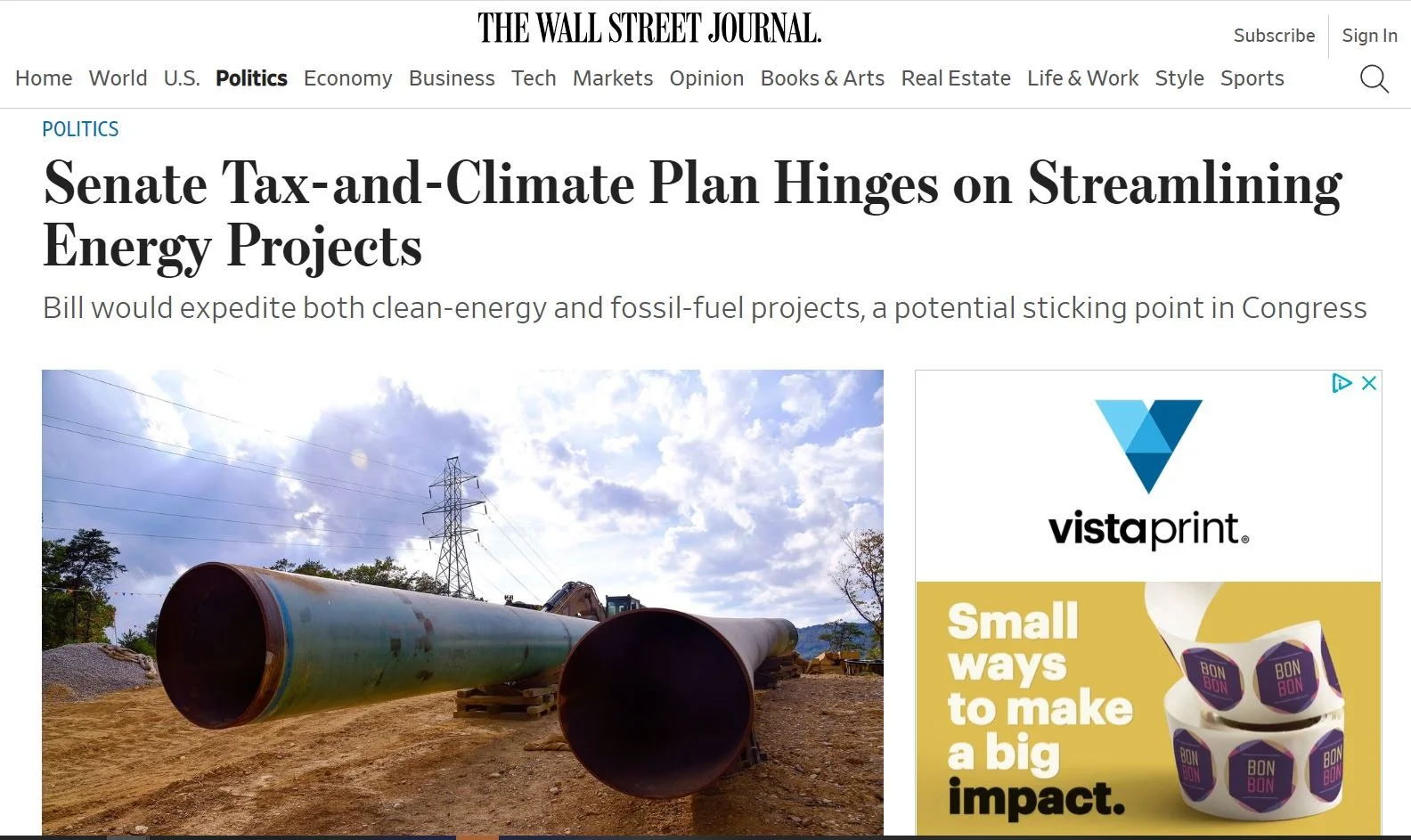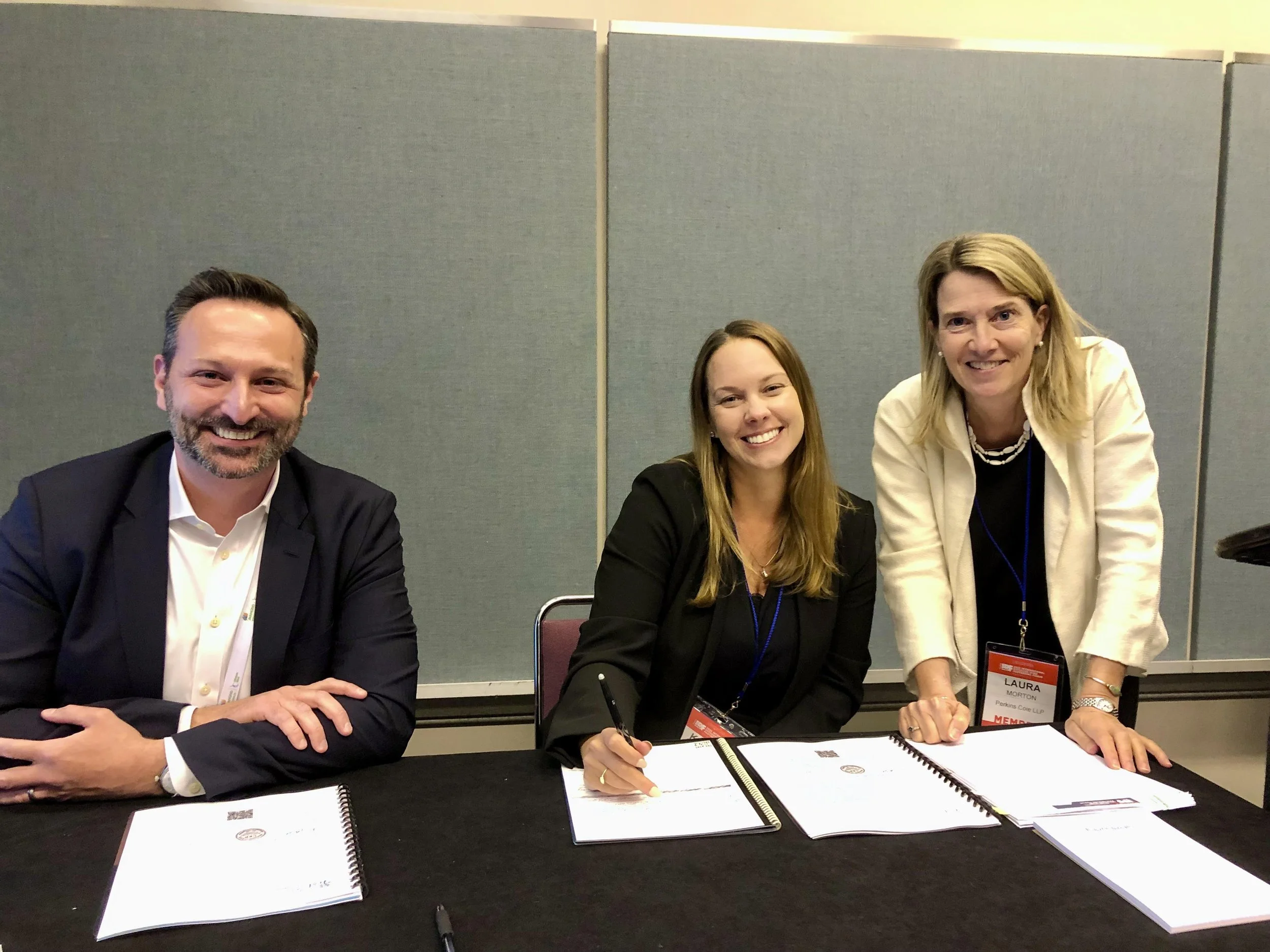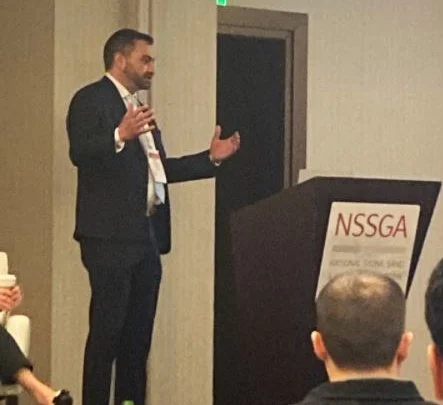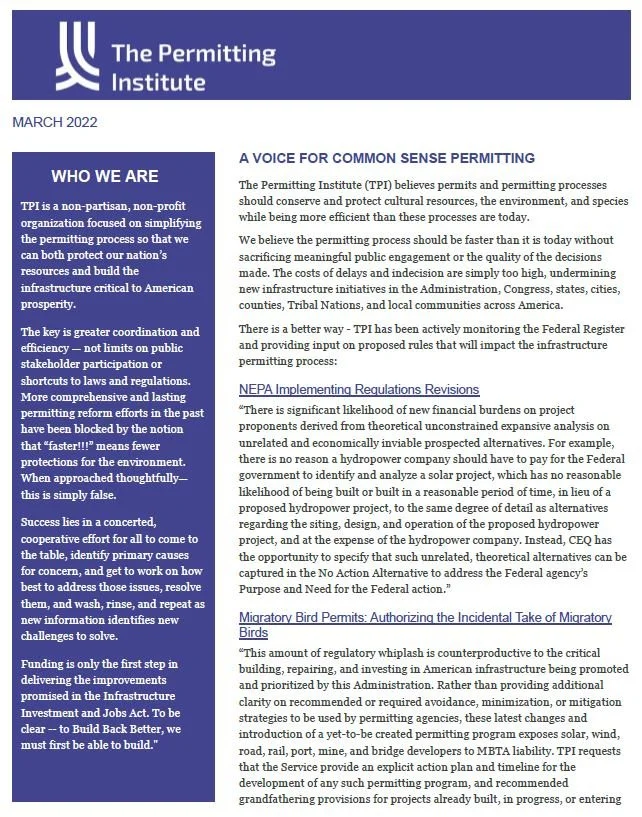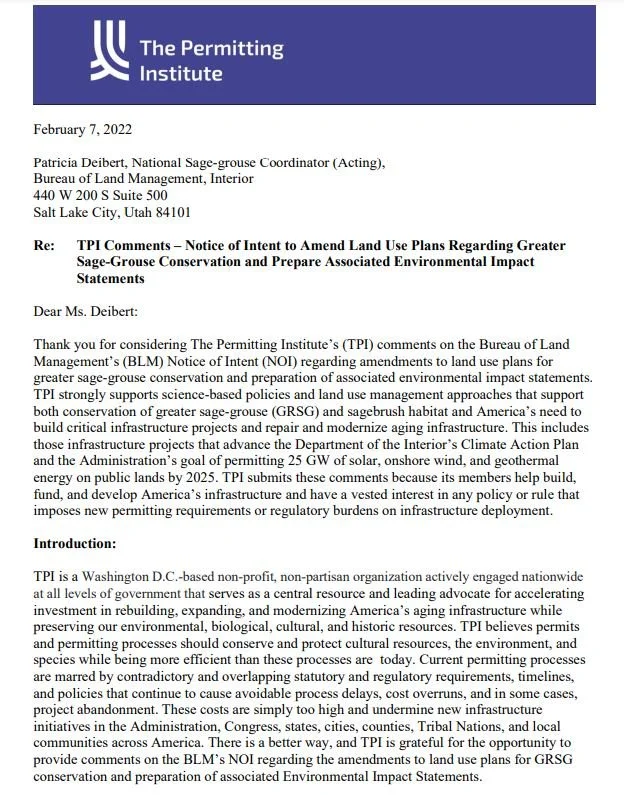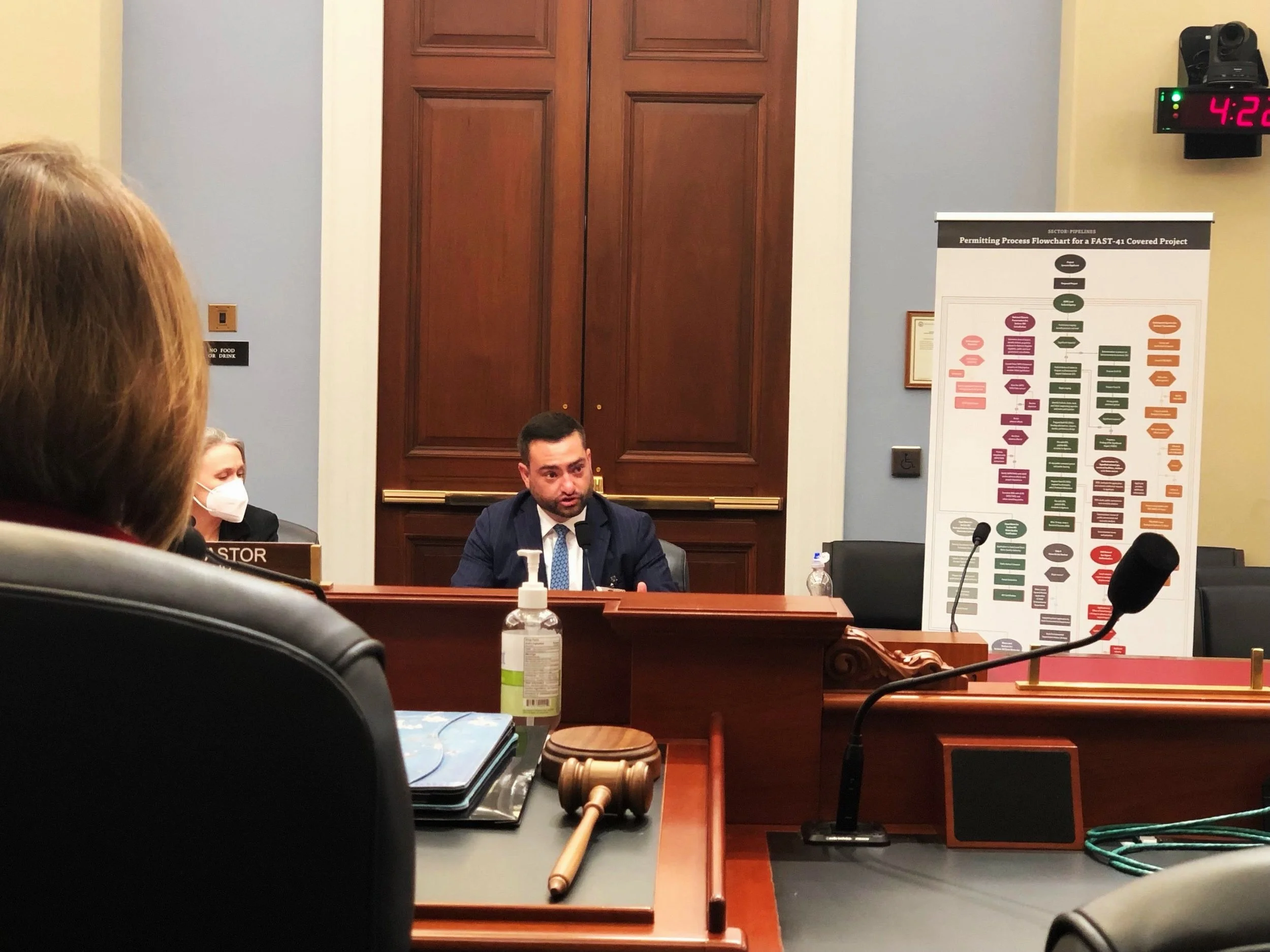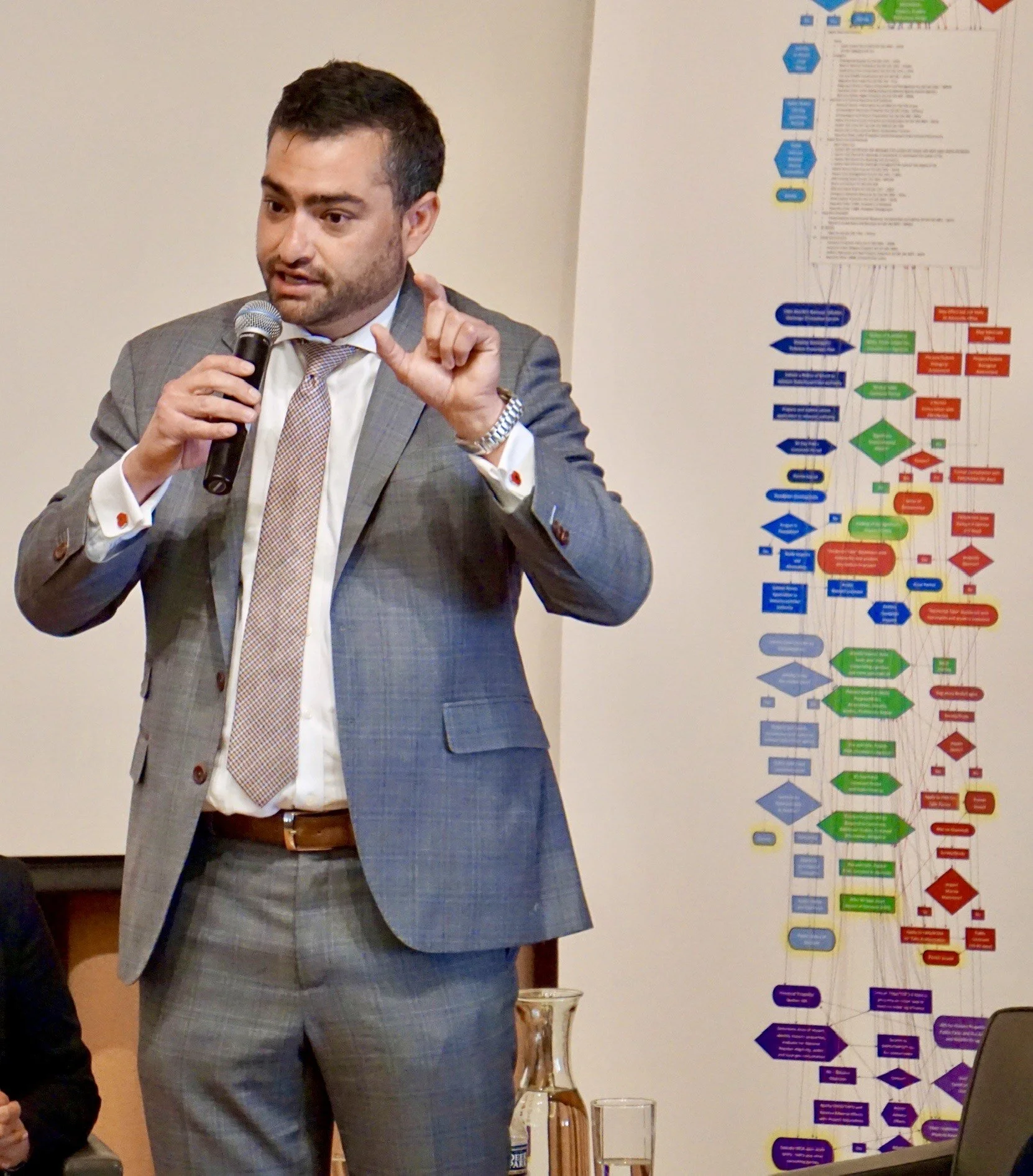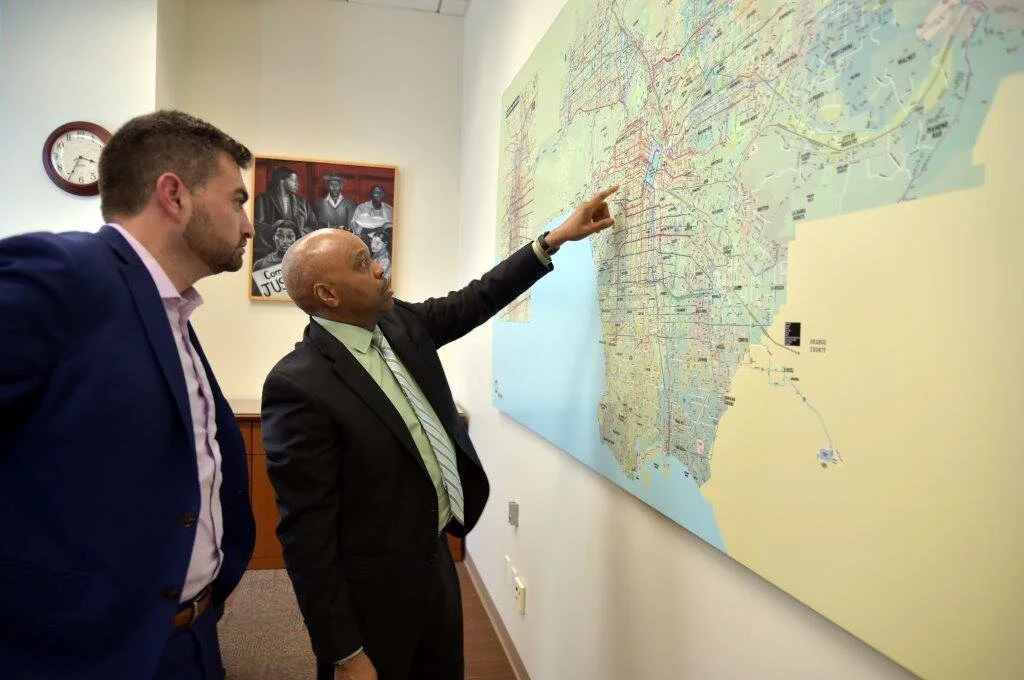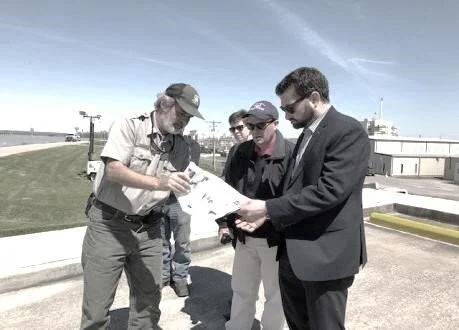February 26, 2025
Herrgott testifies at House hearing focused on America’s energy reliability
TPI president Alex Herrgott testified before the House of Representatives Committee on Oversight and Government Reform at a hearing titled Leading the Charge: Opportunities to Strengthen America’s Energy Reliability.
Currently, a lengthy 7–10-year project development cycle for major infrastructure – a significant portion of which is consumed by the unpredictable federal permitting process – keeps the U.S. from achieving many of its energy goals.
Click the link below to read Herrgott’s full Congressional testimony.
July 25, 2024
Bloomberg Law: US Permitting Agency Eyes Permanent Roots, Broader Portfolio
TPI president and former Executive Director of the Federal Permitting Improvement Steering Council (FPISC) Alex Herrgott comments included in Stephen Lee’s analysis of the planned expansion of FPISC.
-Excerpt from the article-
“Project proponents will be able to challenge the objective determination of an agency that they do not believe is legally sufficient,” agreed Herrgott, now president of the Permitting Institute.
“They can argue the agency was too restrictive. Or an opponent of the project can argue they weren’t restrictive enough,” Herrgott said. “The court is going to have to evaluate all perspectives from all parties on what they believe the prevailing science is.”
Click the link below to read the full story from Bloomberg Law. (subscription required)
July 5, 2024
Bloomberg Law: Chevron Ruling Roils Permitting System Biden Sought to Steady
TPI president Alex Herrgott offered thoughts to Bloomberg Law’s Stephen Lee on potential impacts of the recent Supreme Court decision.
-Excerpt from the article-
It’s not yet clear how decisions made under the National Environmental Policy Act will be affected by the high court’s decision in Loper Bright Enters. v. Raimondo, which overturned the Chevron doctrine shielding federal agencies’ interpretations of their rulemaking authority. And that uncertainty is harmful, given how sensitive financiers can be when the outcome of a project is up for grabs, and how hard the Biden administration has worked to create reliable processes that make permitting more predictable.
“Developers are processing the reality of this uncertainty,” said Alex Herrgott, who led the Federal Permitting Improvement Steering Council under former President Donald Trump. “The concern as they attempt to predict risk over a seven- to 10-year permitting lifecycle is approaching a muted level of panic.”
Click the link below to read the full story from Bloomberg Law.
February 27, 2024
Utility Dive: Congressional action on energy permitting remains stuck, but states, developers are finding solutions
TPI president Alex Herrgott offers thoughts on Congressional delays to taking meaningful action on permitting reform.
-Excerpt from the article-
Current federal legislative and regulatory proposals do not offer real solutions to permitting delays or use solutions available now, like creating greater transparency and accountability at permitting agencies, TPI’s Herrgott and former FERC Chair Hoecker said.
“CITAP is the veneer of a solution” and the federal bills are inadequate because they both call for accelerating the process but do little to give permitting agencies incentives to resolve impediments, Herrgott said. Faster permitting can be done without more environmental harm, “if there is absolute transparency at the permitting agencies” on project applications, but right now “coordination and transparency are the exception, not the rule,” he said.
Click the link below to read the full story from Herman K. Trabish at Utility Dive.
March 14, 2023
TPI delivers comments regarding proposed renewable energy production
The Permitting Institute recently offered comments to the Bureau of Land Management (BLM) as the Bureau evaluates steps to expand renewable energy development.
As an advocate for improved and faster permitting and protection of the United States' resources, TPI strongly supports agency efforts to “increase renewable energy production on [public lands]…while ensuring robust protection for our land, waters, and biodiversity and creating good jobs.” In this regard, TPI urges the BLM to carefully evaluate every aspect of the proposed action to determine its effectiveness in achieving both objectives.
February 15, 2023
Bloomberg Law: Energy Permitting ‘Ripe’ for Bipartisan Overhaul, Lawmakers Say
The Permitting Institute continues to advance conversations to bring achievable permitting reforms that will support the durable solutions needed to transform trillions of invested dollars into infrastructure action. TPI president Alex Herrgott spoke with Bloomberg Law on the next steps needed from Congress.
-Excerpt from the article-
Herrgott, who is coordinating talks among congressional offices, said a draft that is still in the works would take a more targeted approach to speeding up permitting decisions than Manchin’s earlier bill.
Some specific issues under discussion include managing sage grouse and right whale populations while also developing solar and offshore wind energy, finding ways to expand ports for liquefied natural gas and hydrogen exports, and encouraging the development of geothermal energy—a sector that is “currently experiencing so many obstacles that it’s not worth people putting capital at risk,” said Herrgott, now president of the Permitting Institute, a pro-development organization.
Click the link below to read the full story from Bloomberg Law. (subscription required)
November 27, 2022
National Journal: Industry buckles in for years-long slog on permitting reform
TPI president Alex Herrgott was featured in Brian Dabbs analysis of the permitting reform landscape as we head toward a new congress.
Click the link below to read the full story from Brian Dabbs at National Journal. (subscription required)
August 8, 2022
TPI in the news
The Permitting Institute continues to be a go-to voice for expert analysis on the achievable permitting reforms that will support the immediate and durable solutions needed to transform trillions of invested dollars into infrastructure action.
-Excerpt from the Wall Street Journal-
Alex Herrgott, a former Trump administration infrastructure official, said that improvements in the speed and transparency of federal permitting decisions would be meaningful to developers, even if an eventual bill doesn't alter existing environmental policy.
July 29, 2022
Permitting Nerds Unite
This week's Schumer-Manchin agreement signals a significant opportunity to advance and codify long-needed reforms to the federal permitting system. TPI continues to work alongside Congress and the administration to identify achievable permitting reforms that will support the immediate and durable solutions needed to transform trillions of invested dollars into infrastructure action.
At TPI, we are proud to call ourselves permitting nerds, and we are committed to working alongside government leaders, advocates, and industry members who share our commitment to deliver the critical infrastructure upgrades America has needed for decades across all sectors.
Our membership includes associations, companies, environmental and conservation stakeholders, and a labor force that supports more than $1 trillion in private investment and billions in IIJA funding. With permission to build, TPI members will bring innovation and efficiency to American homes and businesses through renewable and conventional energy, transmission, broadband, water, coastal restoration, surface transportation, and other critical infrastructure sectors.
Click the links below to see more coverage of TPI’s work.
-Excerpts from the article by Stephen Lee-
The promise of a vote on legislation shows a recognition by congressional leaders and the White House that existing mechanisms such as FPISC—which tries to iron out conflicts between various agencies early in the permitting process, but whose services are offered on a voluntary basis—aren’t enough to put a meaningful dent in permitting timelines, said Herrgott, now president of The Permitting Institute, a pro-development organization.
“There is no silver bullet to fixing the eight to 10 years it takes for a project to go from funding to shovel-in-the-ground,” he said. “Which is why, from the outset, early this spring, the staff that created the permitting elements of this proposal have identified a suite of practical and cost-cutting changes to current laws sourced from developers, labor, and impacted communities, built for bipartisan support.”
May 17, 2022
Bloomberg Law: White House Adds ‘Oomph’ to Tiny Environmental Permitting Office
TPI president Alex Herrgott and executive vice president Karen Hanley were included in Stephen Lee’s coverage of the Biden Administration’s Permitting Action Plan, which includes a 90-day deadline for agencies to develop plans for improving permitting.
-Excerpts from the article by Stephen Lee-
Karen Hanley, who preceded Harada as FPISC’s deputy and acting director under Biden, said the council’s efforts led to a 45% time savings for NEPA during her tenure. On average, the federal permitting process was finished within 30 days of the schedule agreed upon at the beginning of the process, said Hanley, now executive vice president of The Permitting Institute, a pro-development association.
—
Permitting practitioners also said Biden’s plans for FPISC won’t amount to much if federal agencies don’t execute.
“Agencies know where the process delays exist, but it requires political will to do the hard work that translates a plan into durable outcomes,” said Alex Herrgott, who led FPISC under President Donald Trump and is now president of The Permitting Institute.
Click the link below to read the full story from Stephen Lee at Bloomberg Law.
May 2, 2022
Community partnerships key to offshore wind success
TPI Executive Vice President Karen Hanley recently spoke at the International Offshore Wind Partnering Forum hosted by Enviro Sciences, Inc. A focus on fostering collaboration to build a more sustainable and equitable energy mix for the future drove the conversation, and Hanley offered insights on her experience fostering community engagement.
Three areas of focus Hanley recommends to foster and advance community partnerships include:
SMART STATE AND REGIONAL PLANNING - The offshore wind industry has a unique opportunity to collaborate with state and local leaders to develop a clear path forward for large scale wind development that addresses unique community needs. One positive practice is the development of advisory groups with members representing community organizations. Examples include Maine’s Offshore Wind Port Advisory Group and New York’s Offshore Wind Industry Advisory Council. This approach provides an early opportunity to identify an accurate scope of project costs and to build a financial plan that incorporates government incentives, PPAs, and other monetary resources.
PARTNERSHIPS - Every community is unique, with its own priorities and concerns, and with its residents already living busy lives. The sheer number of projects proposed for a given region can leave project teams overwhelmed, which can inadvertently undermine effective outreach activities. Industry collaboration and a dedicated team member focused on partnerships with community leaders and local businesses are strategies to avoid this challenge. Strong partnerships are proven to (1) improve community turnout overall; (2) help ensure the impacted community is being accurately represented; and (3) foster meaningful dialogue regarding development impacts and benefits in an efficient manner that respects the time of all involved.
WORKFORCE DEVELOPMENT – Offshore wind development is in different stages around the country, and workforce development needs to ramp up in order for continued growth across the industry and to leverage local economic opportunities that exist far beyond the initial construction jobs. Thankfully, the offshore wind industry is already hard at work creating workforce development programs to prepare workers for upcoming STEM opportunities (near-term and long-term) but can also work with state and local leaders to promote sustainable economic development within the surrounding communities that support growth.
Beyond Hanley’s panel, a variety of other valuable content was included during the forum. Click the link below to review the agenda and resources offered. Topics include:
Minimizing and Mitigating Potential Environmental Justice Impacts from Offshore Wind Port Facilities through Adaptive Public Engagement
A Step Above: An Adaptive Approach to Community Engagement for OSW Projects
A Shared Vision on the Development of an Offshore Wind Supply Chain
Guiding Principles for Offshore Wind: Stakeholder Engagement
Click the link below to learn more.
TPI Executive Vice President Karen Hanley prepares to speak at the International Offshore Wind Partnering Forum hosted by Enviro Sciences, Inc.
March 30, 2022
Herrgott speaks at National Stone, Sand & Gravel Assoc. Convention
TPI president Alex Herrgott offered the following comments after speaking at the National Stone, Sand & Gravel Association convention in Nashville, TN.
"TPI is proud to partner with NSSGA and its member companies. Their work to produce and deliver the materials that build America is critical in our efforts to revitalize U.S. infrastructure. We will continue to work side-by-side with NSSGA to turn infrastructure promises into progress for America."
Click the links below for more coverage from NSSGA:
TPI President Alex Herrgott speaks at the 2022 NSSGA Convention in Nashville, TN.
Photo by Mark Kuhar www.rockproducts.com
March 23, 2022
TPI’s March Updates
With infrastructure at the forefront of the Biden administration’s domestic spending agenda, The Permitting Institute continues to advocate for the changes needed to ensure that projects that are promised can become a reality.
In short, we believe the permitting process should be faster than it is today without sacrificing meaningful public engagement or the quality of the decisions made.
Learn more about our ongoing work to improve the permitting process and deliver the infrastructure improvements America needs in this month’s TPI Update. - Click here to read TPI’s March Update
February 7, 2022
TPI delivers comments to proposed BLM rulemaking
Today, The Permitting Institute offered comments to the proposed Bureau of Land Management (BLM) rulemaking regarding amendments to land use plans for greater sage-grouse conservation and preparation of associated environmental impact statements.
“Our members are keenly aware that the permitting process must be simplified if we are going to deliver the infrastructure progress America desperately needs,” said TPI Senior Vice President Ross Pilotte. “In order to do that, we have to ensure that new rules don’t lead to unintended consequences and complexities. There must be a balance between progress and protection, and engaging in the rulemaking process is a critical component to improving the federal permitting system.”
NOI to Amend Land Use Plans Regarding Greater Sage-Grouse Conservation - Click here to read TPI’s comments
January 10, 2022
TPI offers input to proposed agency rules
Gathering member perspective and ensuring that all stakeholder voices are heard through the federal rulemaking process is a key component of The Permitting Institute’s mission.
“Our years of experience inside and outside the federal system offers unique awareness of the potential impact of proposed rules,” said TPI Senior Vice President Ross Pilotte. “We are working alongside our members, agency staff, and all stakeholders to deliver guidelines and regulations that provide progress and protection."
While Congress grants federal agencies the authority to regulate certain activities, public comments and expert analysis are key to ensuring that those regulations are both reasonable and effective. The Permitting Institute actively monitors the Federal Register and offers input on proposed rules that will impact the infrastructure permitting process.
Recently, TPI submitted comments to proposed rules offered by the Council on Environmental Quality (CEQ) and the U.S. Fish and Wildlife Service.
Council on Environmental Quality: NEPA Implementing Regulations Revisions - Click to read TPI’s comments
U.S. Fish and Wildlife Service: Migratory Bird Permits: Authorizing the Incidental Take of Migratory Birds - Click to read TPI’s comments
December 9, 2021
TPI testimony calls for collaboration and common sense amid permitting chaos
TPI president Alex Herrgott testified before the House Select Committee on the Climate Crisis at a hearing titled Cleaner, Cheaper Energy: Climate investments to help families and businesses.
In his testimony, Herrgott introduced The Permitting Institute’s mission and the commitment of TPI’s team of permitting experts. He continued by emphasizing the need to untangle the web of permitting confusion caused by overlapping and conflicting requirements across dozens of Federal and state agencies, and hundreds of permitting laws.
"TPI’s members and the members of your committee know all too well that funding is only the first step in delivering the improvements promised in the Infrastructure Investment and Jobs Act. To be clear -- to Build Back Better, we must first be able to build."
Click the link below to watch Herrgott’s full testimony (testimony begins at 29:20)
“While we are based here in Washington D.C., TPI’s most important work happens in the field, and across the country, where most critical project approvals occur.”
November 12, 2021
National Journal: Will environmental permits hold up massive infrastructure push?
-Excerpts from the article by Brian Dabbs-
President Biden is set to sign the $1.2 trillion infrastructure package into law Monday, after more than a dozen Republicans in each chamber helped to get the legislation over the finish line. But breaking ground on those projects before Election Day could come down to an arcane, albeit widely used, statute designed to protect local ecosystems and prevent broader environmental hazards like climate change.
…
“That level of uncertainty is happening at the wrong time,” said Alex Herrgott, a top permitting official in the Trump administration who now runs the Permitting Institute, which helps companies get project approvals. “Our focus has to be: How do we hit that critical realistic balance between protecting the natural environment, which CEQ is trying to do, and the new expectations for massive new infrastructure development that can’t take 7-8 years from concept development to shovel-in-the-ground if we want to hit the climate-change targets that the president is talking about? You can’t have it both ways.”
Read the rest of this story on National Journal’s website. (subscription required)
October 27, 2021
Herrgott testifies at Senate hearing focused on critical energy infrastructure
Today, TPI president Alex Herrgott testified before the Senate Committee on Homeland Security and Government Affairs at a hearing titled Strategies for Improving Critical Energy Infrastructure. He was a Democratic witness invited by Senator Kyrsten Sinema (D-AZ), and his testimony highlighted the relationship between skyrocketing energy costs and the permitting delays experienced by so many renewable energy projects.
Currently, a lengthy 7–10-year project development cycle for major infrastructure – a significant portion of which is consumed by the unpredictable federal permitting process – keeps the U.S. from achieving many of its renewable energy goals.
Click the link below to watch Herrgott’s full testimony before the Subcommittee on Government Operations and Border Management (testimony begins at 22:30)
October 8, 2021
Bloomberg Law: Round Two of Environment Permit Change to Ask: Revert or Refine?
-Excerpt from the article by Stephen Lee-
Alex Herrgott, who led the Federal Permitting Improvement Steering Council during the Trump years, surmised that CEQ left a second rulemaking dangling to react to the outcome of the bipartisan infrastructure package and its NEPA provisions.
The new rulemaking could risk the solar arrays, wind farms, and transmission lines that must be built to reach Biden’s plan to create a carbon-free power sector by 2035, said Herrgott, now president of The Permitting Institute, a pro-development association.
Click the link below to read the full story from Stephen Lee at Bloomberg Law.
September 16, 2021 - Press Release
Former Biden Permitting Chief Joins The Permitting Institute
Washington, D.C. The Permitting Institute (TPI) announced today that Karen Hanley will serve as executive vice president, adding more than a decade of permitting and project planning experience from the highest levels of government and private sector service to its leadership team. Hanley, the former acting executive director of President Biden’s Federal Permitting Improvement Steering Council (FPISC), has championed the largest renewable energy and climate change coastal protection projects in the nation.
Hanley’s leadership at FPISC under Presidents Biden, Trump, and Obama, along with her work as the deputy associate director for the National Environmental Policy Act (NEPA) at the White House Council on Environmental Quality (CEQ), have guided major solar, wind, electricity transmission, and carbon capture projects around bureaucratic obstacles to deliver results for the environment, the economy, and communities across the nation.
Hanley’s move to TPI received praise from state and industry leaders across the nation.
“While at FPISC, Karen’s commitment to sustainable conservation and natural ecosystem protection was evident as she prioritized projects that mitigate the impacts of extreme weather and climate change,” said Chip Kline, Chairman of Louisiana’s Coastal Protection and Restoration Authority (CPRA). “She was an essential partner for Louisiana as we worked to streamline the federal review and permitting process. Without Karen, the progress we are now experiencing would have been delayed by years.”
"At Leeward, we know project execution problem solvers with Karen Hanley’s ability and experience are hard to come by,” said Laura Abram, Director of Legislative and Public Affairs for Leeward Renewable Energy. “I am pleased Karen is taking her past successes to The Permitting Institute. The United States can’t afford any delays in bringing renewable energy projects from concept to completion if we are to meet the President’s bold national renewable energy targets.”
Hanley joins TPI at a crucial time, as Congress and the Administration work to address America’s infrastructure and climate change challenges. She will lead recruitment of a diverse group of federal, state, tribal, environmental, and industry permitting experts, who will deliver on TPI’s mission to accelerate investment in rebuilding, expanding, and modernizing America’s aging infrastructure while preserving our environmental, cultural, and historic resources.
“We have a once in a generation opportunity to rebuild and expand our infrastructure, but the country will struggle to reach our climate and energy independence targets without major improvements to the permitting process,” Hanley said.
“Karen is a visionary in the permitting world,” said Alex Herrgott, TPI President & CEO. “She possesses scientific, environmental, and permitting expertise that she brings to bear for stakeholders and project developers. Karen transcends obstacles through a collaborative and inclusive approach and identifies opportunities that save time and resources for the largest projects in the country.”
Hanley’s career began in the private sector as a project manager focused on global infrastructure, environmental, and social development. She went on to serve as an environmental protection specialist for the U.S. Coast Guard where she helped resolve wetland, terrestrial, coastal, and marine issues.
Hanley is a Harvard Kennedy School Senior Executive Fellow, a Stanford Certified Project Manager (SCPM), and holds a M.S. in Biological Sciences from Florida Atlantic University and a B.S. in Biology and Marine Science from the University of Miami.
# # #
Contact: Erin Mowry, press@permittinginstitute.org
“We have a once in a generation opportunity to rebuild and expand our infrastructure, but the country will struggle to reach our climate and energy independence targets without major improvements to the permitting process.”
-Karen Hanley, TPI Executive Vice President
August 2, 2021
Bloomberg Law highlights TPI’s efforts to develop state permitting councils
-Excerpt from the article by Stephen Lee-
The man who tried to speed up federal permitting during the Trump administration is now trying to help states do the same thing.
The efforts underway in California, Florida, Louisiana, Alaska, and elsewhere could cut state permitting timelines in half, according to Alex Herrgott, former head of the Federal Permitting Improvement Steering Council. The council brings federal agencies together to smooth out permit reviews for large infrastructure projects.
The changes not only would get projects like wind farms, solar projects, and transmission lines built faster, he said, but also would keep investors from growing impatient and pulling their money out.
“It really is the dark ages in some states, and that’s a problem,” Herrgott said.
Read the full article at the link below.
“State permitting councils are not a Republican or Democrat political tool to expedite a project,” Herrgott said. “They do not guarantee an outcome, only that a decision is made in a timely manner.”
Click here to learn more about TPI’s work to develop and support state permitting councils.
July 26, 2021 - PRESS RELEASE
Ross Pilotte Joins The Permitting Institute as Senior Vice President
Washington, D.C. Ross Pilotte, a former senior official with the Federal Permitting Improvement Steering Council (FPISC), joined The Permitting Institute (TPI) as Senior Vice President. Pilotte brings years of experience addressing and solving permitting challenges for the nation’s largest infrastructure projects. As a leader on FPISC’s staff, Pilotte worked with an array of industry sectors and coordinated with multiple federal agencies. He successfully removed bureaucratic obstacles and reduced delays to improve project outcomes.
Pilotte received praise from industry leaders across the nation.
“Ross’s critical thinking, creative problem solving, and extensive understanding of the policies and dynamics of agency staff in D.C. is an extremely valuable resource,” said Ricardo Graf, Chief Development Officer and Managing Partner at Arevia Power. “NEPA timelines are crucial to the delivery of billions of dollars of renewable energy project investments, and Ross assisted us in keeping the Gemini Solar Project, the largest solar plus battery project in the U.S. and one of the largest in the world, on schedule.”
“The relentless dedication and no-nonsense approach to helping us solve for ever-increasing project permitting issues is what made Ross and his team so valuable,” said Sean Strawbridge, CEO of the Port of Corpus Christi Authority. “Over $55 billion dollars of public/private investment and nearly 10,000 new jobs have materialized over the last seven years in the South Texas Coastal Bend, creating nearly $40 billion in annual economic output for the Corpus Christi area. He’s a solid addition to any project development team.”
“Ross was an essential partner for Louisiana as we worked to streamline the federal review and permitting process for our largest-ever coastal restoration project,” said Chip Kline, Chairman Coastal Protection and Restoration Authority (CPRA). "The progress we are experiencing now would have been delayed by years without Ross and FPISC."
In his new role, Pilotte will lead TPI’s member support team, helping TPI members navigate the complicated maze of permitting at the federal, state, tribal, and local levels to accelerate project delivery.
“Ross knows how to get results, routinely driving projects through the permitting process on time and under budget, while maintaining strong protections for the environment and inclusive public engagement,” said Alex Herrgott, TPI President & CEO. “Ross has a unique ability to forecast permitting problems before they emerge. He is an incredible asset for TPI, our members, and everyone invested in improving the permitting process.”
Pilotte brings a wealth of experience to TPI after serving in the Obama, Trump, and Biden administrations. While at FPISC, he was a primary point of contact on major projects with permitting issues. He also served on the White House Environmental Justice Interagency Working Group.
Prior to FPISC, Ross worked as an endangered species biologist in support of the National Marine Fisheries Service at the National Oceanic and Atmospheric Administration (NOAA) and as a water policy specialist at the Environmental Protection Agency (EPA). He was a permitting and compliance specialist in the private sector prior to entering public service.
Ross is a Worcester, Massachusetts native, attended North Carolina State University’s Fisheries and Wildlife Biology program, and holds several professional certifications.
About The Permitting Institute
The Permitting Institute (TPI) is a Washington, DC based non-partisan association dedicated to accelerating investment in rebuilding, expanding, and modernizing America’s aging infrastructure while preserving our environmental, cultural, and historic resources. TPI’s senior leadership previously led the Federal Permitting Improvement Steering Council and delivered an unprecedented track record in time savings for projects under their management, including some of the largest renewable and conventional energy projects in the world.
# # #
Contact: Erin Mowry, press@permittinginstitute.org
July 15, 2021
The Permitting Institute expresses support for the Federal Permitting Reform and Jobs Act
The Permitting Institute (TPI) president Alex Herrgott joined a large group of bipartisan leaders in expressing support for the Federal Permitting Reform and Jobs Act. The bill was introduced by Senators Rob Portman (R-OH), Kyrsten Sinema (D-AZ). Senators Dan Sullivan (R-AK) and Joe Manchin (D-WV) are the bill’s original co-sponsors.
“I applaud Senators Portman and Sinema for introducing the bipartisan Federal Permitting Reform and Jobs Act because bipartisan support for the Permitting Council has paid dividends for jobs, the economy, and the environment. “The Council has delivered a 60% average reduction in time to process permits while maintaining strong protection for the environment, vulnerable communities, and our historical and cultural landmarks. These improvements have helped create more than 100,000 new jobs across all infrastructure sectors, and are growing as more than $100 billion projects begin their FPISC permitting journey over the next year. These results are worthy of continued investment, and I fully support additions in this legislation that empower Executive Director Harada and her team to fill the resources gap at the state, Tribal and local level—where permitting bottlenecks often occur.”
Herrgott’s support was offered alongside leaders from business, government, and many other stakeholder communities. The full release is available at the link below.
July 2, 2021
The Permitting Institute’s statement on Arizona’s creation of a state permitting dashboard:
The Permitting Institute (TPI) president Alex Herrgott offered this statement following the state of Arizona’s creation of a state permitting dashboard. This new tool adds Arizona to the growing list of states who recognize the importance of transparency, predictability, and process efficiency as project developers prepare to invest more than $120 billion—this year alone—in states across America.
“Arizona is leading the way and The Permitting Institute stands ready to continue its support and partnership with states working to create their own state dashboards and councils. These advances save millions and cut years in delays through enhanced coordination of the dozens of federal, state, and tribal project authorization decisions required before construction can begin. This is the next important step in providing greater transparency and driving economic investment across all infrastructure sectors, including more than $20 billion in conventional and renewable energy in Arizona alone.
“All citizens deserve a transparent process and timeline for the project decisions that will affect their daily lives, which is what Arizona’s dashboard will provide. This is not a tool to override stakeholder concerns for the sake of speed. It is a process tracking tool that will elevate issues to the newly appointed position of State Permitting Director, as well as the appropriate regulators across multiple Arizona environmental and resource protection agencies.
“My testimony before the Arizona state legislature focused on the benefits of this bipartisan movement to remove redundant bureaucracy and deliver progress. Many stakeholders and constituencies participated to voice concerns and deliver improvements. In particular, Governor Ducey, Chairman Gowan, the Inter-Tribal Council of Arizona, the Grand Canyon Sierra Club, and Arizona infrastructure and environmental protection leaders Steve Trussell, Mike Ingram, and Spencer Kamps were critical throughout consideration of this process to bring the dashboard model to the state level where it will benefit Arizona’s residents, environment, and economy.”
About The Permitting Institute
The Permitting Institute (TPI) is a non-partisan association dedicated to accelerating investment in rebuilding, expanding, and modernizing America’s aging infrastructure while preserving our environmental, cultural, and historic resources. TPI’s senior leadership previously led the Federal Permitting Improvement Steering Council and delivered an unprecedented track record in time savings for projects under their management, including some of the largest renewable and conventional energy projects in the world.
About State Permitting Councils:
State Permitting Councils and state dashboards align critical approvals for large infrastructure projects that are dependent on a complicated maze of dozens of federal, state, tribal, and local government decisions. Focused oversight and greater transparency build upon the federal process improvements initiated in 2015 with the creation of the Federal Permitting Improvement Steering Council (FPISC), which was passed with bipartisan Congressional support and signed into law by President Obama.
The benefits of State Permitting Councils:
Creates and communicates a realistic and coordinated permitting timetable across federal, state, tribal, and local levels to reduce duplicative work, unnecessary delays, and cost overruns.
Aligns federal, state, tribal, and local entities through concurrent environmental reviews and authorizations.
Establishes a central point of contact within a state and prioritizes accountability and efficiency to manage project timetables and authorization deadlines.
Identifies systemic causes of delay and ensures early outreach and transparency to public and private stakeholders.
Creates jobs and economic opportunity by attracting public and private investment in new projects.
Publicly displays updated permitting timetables and causes for delay to provide stakeholders and members of the public to track the status of state permitting activities in real-time.
Alex Herrgott testifies before the state of Arizona’s Senate Appropriations Committee regarding the benefits of creating a state permitting dashboard.
June 4, 2021
Alex Herrgott’s statement on appointment of FPISC Executive Director Christine Harada:
“I'm excited for Christine to carry forward FPISC's mission of bringing efficiency and government accountability for the $500 billion worth of projects in the active pipeline. As the Acting Executive Director, Karen Hanley has done an amazing job driving the process to reduce delays in the often murky and unpredictable world of infrastructure permitting. Christine's experience inside and outside government will guide FPISC’s focus to deliver results and provide project developers with a true federal partner to advance the major infrastructure goals set forth by President Biden.”
Herrgott was also quoted in Bloomberg reporter Stephen Lee’s coverage of Harada’s appointment. Click the link below to read the story. (subscription required)
May 17, 2021
Alex Herrgott: To ‘build back better’ we must first be able to build
Finding bipartisan compromise on the size and scope of an infrastructure bill will be hard enough. But policymakers are ignoring perhaps the most essential issue — permitting, which has become a maze of process obstacles that only Congress can address.
Read the rest of TPI President Alex Herrgott’s op-ed in The Hill.
April 28, 2021
Politico Pro: Former Trump official to launch permitting advocacy group
“If there’s somebody who with this new endeavor can figure out a way to bring both sides together to crack a compromise, it’s Alex,” said a Senate Democratic leadership aide who worked with Herrgott on passing the 2015 surface transportation bill known as the FAST Act, which authorized federal highway and public transportation spending.
Read the rest of Zack Colman’s coverage of The Permitting Institute in Politico Pro. (subscription required)



